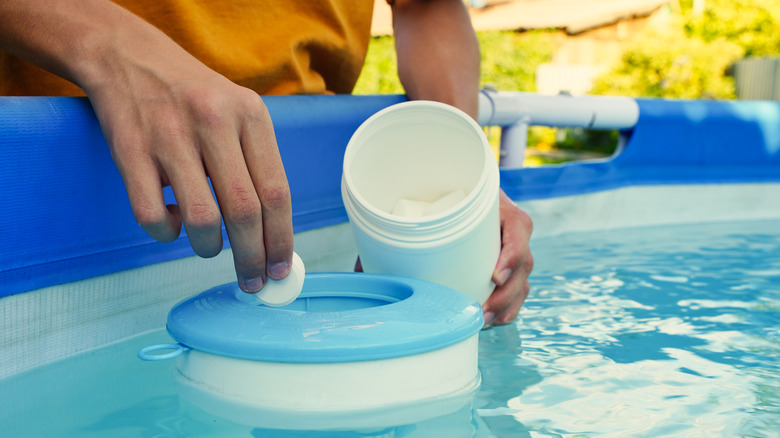Chlorine Won't Kill This One Unpleasant Pool Parasite
As you spring off the diving board to cannonball into the crystal blue pool water below, the last thing you're probably thinking about is whether or not that water is sanitary. After all, you're swimming in a chemically-treated pool. That means all contaminants have already been taken care of by chlorine and other substances, right?
Chlorine is among the various chemicals added to pool water in order to kill germs, reports the U.S. Centers for Disease Control and Prevention (CDC). Many of these germs are introduced to the water through humans by way of sweat, feces, urine, and more. However, chlorine is not an instant fix. Rather, free chlorine can take several minutes to work its magic, depending on what type of virus, bacteria, or parasite is present in the water. For example, free chlorine can eliminate E. coli bacteria in under 60 seconds, but will need approximately 16 minutes to kill off the Hepatitis A virus. This number jumps to 45 minutes for the Giardia parasite. However, there is one type of parasite that is particularly resistant to chlorine.
What is cryptosporidiosis?
Termed "Crypto" for short, the CDC explains that Cryptosporidium is an illness-causing parasite that can remain alive in pools for an extended amount of time even after the water has been properly treated with chlorine. What enables it to do so is its protective shell covering. Because the parasite can be shed through human fecal matter, crypto exposure through pool water can lead to cryptosporidiosis infection in humans. While the main symptom experienced is usually diarrhea, this may also be accompanied by nausea, fever, vomiting, cramping, dehydration, and more.
Infection is not always apparent right away. Rather, it can take up to ten days before a person starts experiencing symptoms (per CDC). While most cases resolve on their own in about seven to 14 days for healthy adults, some people may experience recurrent waves of symptoms that persist for about a month. More than 740,000 people are affected by cryptosporidiosis annually (via CDC).
So just how long can this parasite remain alive and well in our swimming pools? The CDC reports that Crypto can live for more than 10 days before free chlorine is able to effectively kill it off.
Protect yourself and others from infection
To keep yourself and others safe from potential infection, there are steps that both individuals and facilities can take. For swimming venues, this may include closing the facility to the public in the event that cases of cryptosporidiosis are detected. The facility may be required by health officials to hyperchlorinate the site, which involves continuously increasing the water's free chlorine concentration levels over the course of a few days (via CDC). Before reopening to the public, facilities will need to backwash or replace filter parts and assess proper chlorine and pH levels in the water for safe swimming.
While the evidence is limited, some research alternatively suggests that ultraviolet (UV) light may be effective at neutralizing Crypto pathogens' ability to transmit infection through DNA damage. However, more research is still needed.
On an individual level, never drink pool water and do not get in the pool if you or a child recently had diarrhea. If cryptosporidiosis is the cause of illness, the CDC advises holding off for 14 days after symptoms have ceased before you resume cannonballing off that diving board.



